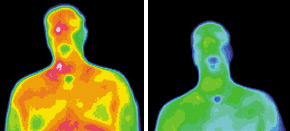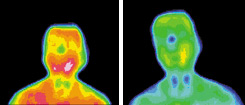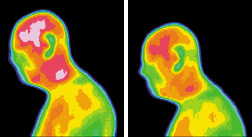What do a 25-year-old male with migraines, an 80-year-old lady with diabetes and a doctor with a brain tumor have in common? To answer this question, let's look at a little experiment that was done recently.
We first took a complete set of infrared images. The subjects then drank 8 ounces of double-helix water. We asked them to hold each mouthful of water for a few seconds before swallowing so that the double-helix shaped water clusters could get absorbed directly to the bloodstream. Otherwise, it has to go through the stomach and intestines to reach the bloodstream. We waited 15 minutes then took another set of infrared images. We compared the before and after images. The color code for the infrared images is: white is the hottest, then red, yellow, green and blue, with the coldest in black. For each case we saw significant changes.
 Fig 1. Infrared images for migraine patient before (left) and 15 minutes after (right) drinking double-helix water. The maximum temperature of the face before is 36.0C and the maximum temperature after is 35.6C.
The interesting thing about the woman with diabetes was that the two hottest spots and the two coldest spots correspond to the ST 4 and ST 9 acupoints on the stomach meridians. The maximum temperatures of these four acupoints all decreased significantly. It looked to me that these four acupoints were most relevant for an acupuncturist to needle in cases of diabetes.
Fig 1. Infrared images for migraine patient before (left) and 15 minutes after (right) drinking double-helix water. The maximum temperature of the face before is 36.0C and the maximum temperature after is 35.6C.
The interesting thing about the woman with diabetes was that the two hottest spots and the two coldest spots correspond to the ST 4 and ST 9 acupoints on the stomach meridians. The maximum temperatures of these four acupoints all decreased significantly. It looked to me that these four acupoints were most relevant for an acupuncturist to needle in cases of diabetes.
The dramatic change of temperature always amazes me. The most perplexing question is why it is so omnipresent. First, in the broadest sense, the body is 70 percent water. Water is in every organ, tissue and cell. Any change in the water structure could affect any part of the body.
Second, the double-helix water contains stable water clusters that are shaped like DNA, which passes on from generation to generation. Double-helix water might be the precursor of DNA and have to do with why a biological entity is alive.
 Fig 2. Infrared images for diabetes subject before (left) and 15 minutes after (right) drinking double-helix water. The maximum temperature of the face before is 36.2C and the maximum temperature after is 34.8C. This is a huge reduction in temperature.
Third, the concept of yin and yang is very fundamental. These stable water clusters have recently been found to have positive and negative charges. These are present in every atom, molecule and cell. Hence, the electric field emitting from the charges of double-helix water could easily affect the atoms, molecules, cells and organs in our body.
Fig 2. Infrared images for diabetes subject before (left) and 15 minutes after (right) drinking double-helix water. The maximum temperature of the face before is 36.2C and the maximum temperature after is 34.8C. This is a huge reduction in temperature.
Third, the concept of yin and yang is very fundamental. These stable water clusters have recently been found to have positive and negative charges. These are present in every atom, molecule and cell. Hence, the electric field emitting from the charges of double-helix water could easily affect the atoms, molecules, cells and organs in our body.
Beyond these broad considerations, let's look at the meridian system to see how these stable water clusters might work specifically to improve a person's health. Our hypothesis is that meridians are made up of these stable water clusters. Similar to the way magnets line up via the attractive force between their north and south poles: The north pole of the first magnet attracts the south pole of the second one. The north pole of the second magnet attracts the south pole of the third one, and so forth. Stable water clusters in the meridians line themselves up in similar fashion.
 Fig 3. Infrared images for subject brain tumor before (left) and 15 minutes after (right) drinking double-helix water. The maximum temperature of the head before is 34.0C and the maximum temperature after is 33.5C. This is statistically significant.
If the stable water clusters are misaligned, the meridian will not function properly. Qi will not flow smoothly. An acupuncture needle inserted in the meridian will cause the muscle to restore the straight-line status of the meridian. Qi then flows smoothly and the body functions properly.
Fig 3. Infrared images for subject brain tumor before (left) and 15 minutes after (right) drinking double-helix water. The maximum temperature of the head before is 34.0C and the maximum temperature after is 33.5C. This is statistically significant.
If the stable water clusters are misaligned, the meridian will not function properly. Qi will not flow smoothly. An acupuncture needle inserted in the meridian will cause the muscle to restore the straight-line status of the meridian. Qi then flows smoothly and the body functions properly.
Another way of restoring the meridian to its proper function is to create another channel for qi. This can be done by adding additional channels of stable water clusters to bypass the blocked part of the meridian. Drinking double-helix water would allow these extra stable water clusters to do the repair job. The flow of qi will not be blocked and the body can function properly.
Drinking double-helix water could have the same effect as inserting acupuncture needles. A single acupuncture needle can treat hundreds of diseases. Since drinking double-helix water is equivalent to inserting acupuncture needles at the right points on the body, it could improve many different kinds of diseases. Double-helix water has additional advantages: It is not painful, it doesn't have any side effects, and it can be done by the patient at home.
We are currently looking for licensed medical practitioners to try this double-helix water on their patients with various health problems. Anyone who wants to try this, please contact . This experiment is important because it provides evidence that meridians are real.
Click here for previous articles by Yin Lo, PhD.




